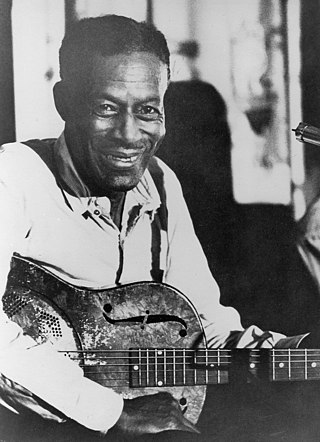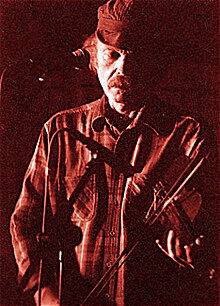
Edward James "Son" House Jr. was an American Delta blues singer and guitarist, noted for his highly emotional style of singing and slide guitar playing.

Anthology of American Folk Music is a three-album compilation, released in 1952 by Folkways Records, of eighty-four recordings of American folk, blues and country music made and issued from 1926 to 1933 by a variety of performers. The album was compiled from experimental film maker Harry Smith's own personal collection of 78 rpm records.

Moran Lee "Dock" Boggs was an American old-time singer, songwriter and banjo player. His style of banjo playing, as well as his singing, is considered a unique combination of Appalachian folk music and African-American blues. Contemporary folk musicians and performers consider him a seminal figure, at least in part because of the appearance of two of his recordings from the 1920s, "Sugar Baby" and "Country Blues", on Harry Smith's 1952 collection Anthology of American Folk Music. Boggs was first recorded in 1927 and again in 1929, although he worked primarily as a coal miner for most of his life.

Booker T. Washington "Bukka" White was an American Delta blues guitarist and singer.
Quill was a rock band that played extensively throughout New England, New York, and the mid-Atlantic states in the late 1960s, and gained national attention by performing at the original Woodstock Festival in 1969. The band was founded by two singer-songwriters and brothers from the Boston area, Jon and Dan Cole.
Joseph Spence was a Bahamian guitarist and singer. He is well known for his vocalizations and humming while playing the guitar. Several American musicians, including Taj Mahal, the Grateful Dead, Ry Cooder, Catfish Keith, Woody Mann, and Olu Dara, as well as the British guitarist John Renbourn, were influenced by and have recorded variations of his arrangements of gospel and Bahamian songs.

The Holy Modal Rounders was an American folk music group, originally the duo of Peter Stampfel and Steve Weber, who formed in 1963 on the Lower East Side of New York City. Although the band was not initially successful, they quickly earned a dedicated cult following and have been retrospectively praised for their pioneering innovation in several genres related to folk music. They also proved to be influential, both during their initial run and to a new generation of musicians like Yo La Tengo and Espers.
Samuel Barclay Charters IV was an American music historian, writer, record producer, musician, and poet. He was a widely published author on the subjects of blues and jazz. He also wrote fiction.
Clamtones was an American folk rock group, and Jeffrey Frederick's most notable band. The best-known incarnation of the band formed in 1975 when Frederick and Jill Gross moved to Portland, Oregon and began playing with the backing band of the Holy Modal Rounders. Although the Clamtones only recorded one studio album, they were a popular act in the Portland music scene. They were inducted into the Oregon Music Hall of Fame in 2011, with the organization noting that the Clamtones "developed a reputation for being 'one of the best bar bands in the country.'"

Jeffrey Sutton Frederick (1950–1997) was a songwriter, guitarist and performer specializing in good-time Americana music—an idiosyncratic blend of folk, country and rock and roll. He was a largely uncredited predecessor of today's alternative country music genre. Also notorious for his pranks, he was a prodigious songwriter, specializing in sly, hilarious and soulful pieces. Frederick's tightly crafted songs and intricate guitar work were praised by the likes of Willie Nelson, Eric Clapton, and Dan Hicks. His songs are being featured in a series of tribute albums, starting with St. Jeffrey's Day: The Songs of Jeffrey Frederick, Volume I (2008). Jeffrey Frederick and the Clamtones were inducted into the Oregon Music Hall of Fame on October 8, 2011.

Have Moicy! is a 1976 album released by Michael Hurley, The Unholy Modal Rounders, and Jeffrey Frederick & the Clamtones. In 2011, Light In The Attic Records reissued Have Moicy! on vinyl. Although nominally credited to three different groups, the music is performed by an overlapping cast of musicians, with Hurley, Frederick, and Peter Stampfel alternating lead vocals with one track sung by Paul Presti.
"I Wish I Was a Mole in the Ground" is a traditional American folk song. It was most famously recorded by Bascom Lamar Lunsford in 1928 for Brunswick Records in Ashland, Kentucky. Harry Smith included "I Wish I Was a Mole in the Ground" on his Anthology of American Folk Music released by Folkways Records in 1952. The notes for Smith's Anthology state that Lunsford learned this song from Fred Moody, a North Carolina neighbor, in 1901.

Peter Stampfel is an American fiddle player, old-time musician, and singer-songwriter.
Folkways Records was a record label founded by Moses Asch that documented folk, world, and children's music. It was acquired by the Smithsonian Institution in 1987 and is now part of Smithsonian Folkways.
Bernard Stollman was an American lawyer and the founder of the ESP-Disk record label.

Indian War Whoop is the third studio album by the Holy Modal Rounders, released in 1967 through ESP-Disk. The album is the band's first with contributions outside of the original members Peter Stampfel and Steve Weber. The title track is a cover of an obscure song featured on Harry Smith's Anthology of American Folk Music.

The Moray Eels Eat the Holy Modal Rounders is the fourth studio album by the New York psychedelic folk band the Holy Modal Rounders, released in 1968 through Elektra Records. Although Peter Stampfel does not regard the album highly, it has received positive reviews and its opener, "Bird Song," was notably included in the 1969 film Easy Rider.

I Make a Wish for a Potato is a compilation album by psychedelic folk band The Holy Modal Rounders, released on April 10, 2001 through Rounder Records. The album draws from the band's three releases on Rounder Records and also includes songs by associated acts such as Michael Hurley as well as the Clamtones.

Bird Song: Live 1971 is a live album by the psychedelic folk band The Holy Modal Rounders, released on April 20, 2004, through Water Records.
Steven P. Weber was an American folk singer-songwriter and guitarist.











